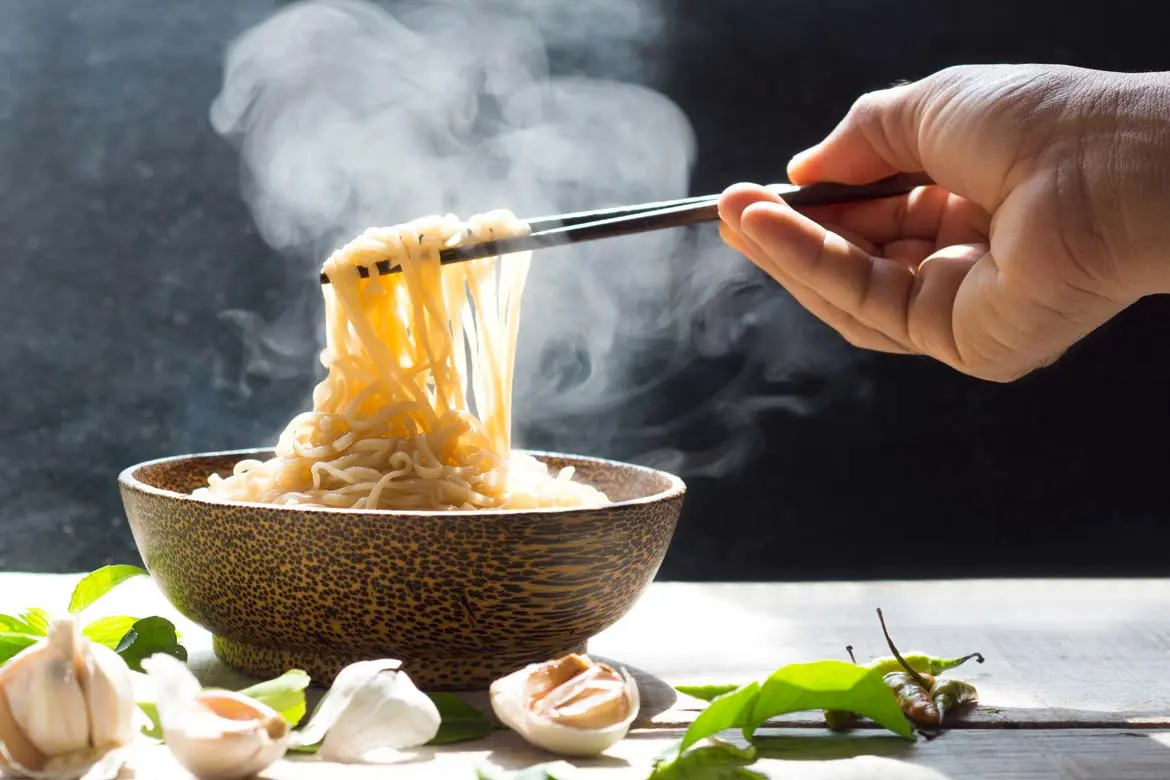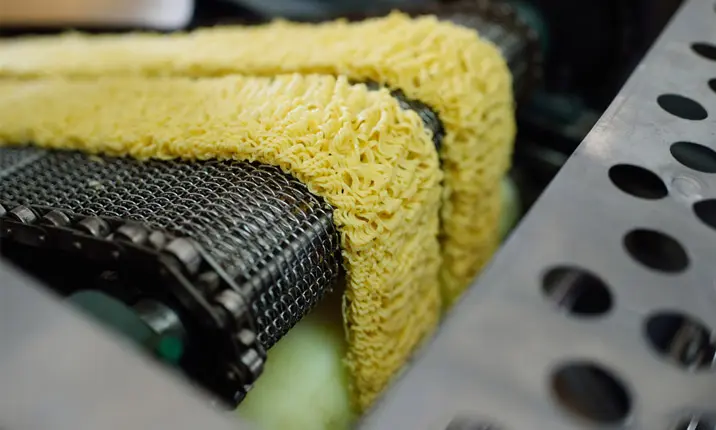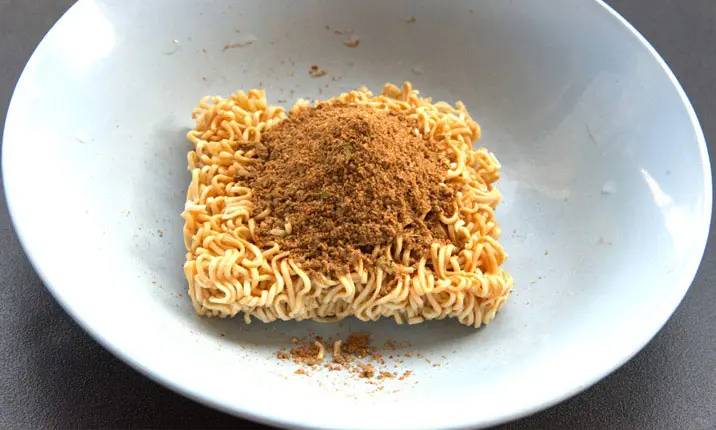What are instant noodles?
Instant noodles are a type of pre-cooked noodle usually sold in individual packets, cups, or bowls. Its main ingredients are typically flour, starch, water, salt, and/or a salt substitute known as kansui, a type of alkaline mineral water that contains sodium carbonate and usually potassium carbonate. Palm oil is also a common ingredient in instant noodles as instant noodles were originally produced by flash frying. However, nowadays, air-dried noodles are also available. Instant noodles come with flavouring packets that contain seasoning, salt, and monosodium glutamate (MSG).
Instant noodles were first made in Japan in 1958. The world's first-ever instant noodles were invented by Momofuku Ando, the Taiwanese-Japanese inventor and businessman who founded Nissin Food Products Co. Ltd. Since its invention, instant noodles have become a well-loved convenience food for millions of consumers all over the world.
How are instant noodles made?
Since its invention in the fifties, the production process for instant noodles remains more or less the same. All the ingredients are mixed together, then the dough is rolled out and cut into noodles. The noodles are steamed, dried, fried for dehydration, cooled, and then packed individually.
What is the nutritional value of instant noodles?
The nutritional content of instant noodles varies slightly depending on the type or flavour of instant noodles. To give you an idea, here's the nutritional content for 1 serving (43g) of instant ramen noodles:
- Calories – 385kcal
- Carbohydrate – 55.7g
- Total fat – 14.5g
- Saturated fat – 6.5g
- Protein – 7.9g
- Fibre – 2g
- Sodium – 986mg
- Thiamine – 0.6mg
- Niacin – 4.6mg
- Riboflavin – 0.4mg
A vast majority of instant noodles are low in calories, but are also low in fibre and protein. They are also notorious for being high in fat, carbohydrates, and sodium. While you will be able to get some micronutrients from instant noodles, they lack important nutrients like vitamin A, vitamin C, vitamin B12, and more.
Why are instant noodles unhealthy?
As much as people love consuming instant noodles for their convenience, affordability, and taste, many don't know that there are underlying health risks involved. Consuming instant noodles on a daily basis can have a number of very serious consequences for your health. Here are a few reasons why instant noodles are bad for you:
They're high in sodium
A single serving of instant noodles can have anywhere between 397 – 3678mg of sodium per 100g serving, sometimes even more. While sodium is an essential mineral for the proper functioning of your body, too much sodium isn't good for your health.
One of the largest contributors to dietary sodium intake is processed foods, including instant noodles. Having a diet high in salt has been linked to an increase in the risk for stomach cancer, heart disease and stroke. In individuals who are considered salt-sensitive, a high-sodium diet may increase their risk for high blood pressure which, in turn, can negatively impact heart and kidney health.
Considering the 2-g-per-day sodium intake recommendation of the WHO, consuming even just one pack of instant noodles would make it very difficult for you to keep sodium intake within the recommended limits. With that said, people who consume multiple packs of instant noodles per day will undoubtedly lead to massive amounts of ingested sodium.
They contain MSG
Instant noodles have MSG, which is a very common additive found in many processed foods. Its primary role is to enhance the flavour and palatability of foods. While it is widely used in many types of foods and is approved for consumption by the FDA, there are concerns regarding its short- and long-term effects on the body.
Anecdotal reports suggest that consumption of MSG has been linked to symptoms like headaches, nausea, high blood pressure, weakness, muscle tightness, chest pain, heart palpitations, and flushing of the skin. If you experience any of these symptoms after consuming MSG, you may have a condition known as the MSG symptom complex. Although there has not been definitive evidence establishing the link, it is acknowledged that a small percentage of people may have these short-term reactions to MSG.
Some studies have also linked high consumption of MSG to obesity and increased blood pressure. However, for the most part, the small amounts of MSG that are found in instant noodles will likely not lead to these side effects as long as they're taken in moderation.
They're low in fibre and protein
Despite being a low-calorie food, instant noodles are low in fibre and protein which may not make them a good option for weight loss. Protein has been proven to increase feelings of fullness and decrease hunger, while fibre moves slowly through the digestive tract, thus promoting feelings of fullness.
Considering the low protein and fibre levels in instant noodles, consuming them regularly likely won't satisfy your hunger or make you feel full at all. In addition, a diet that is low in fibre is associated with a higher risk of digestive conditions such as constipation and diverticular disease as well as reductions in healthy gut bacteria.
They have been linked to poor diet quality
Some studies have shown that regular consumption of instant noodles is associated with poor overall diet quality. In one study, diets of those who consumed instant noodles were compared to those who didn't. The instant noodle consumers were found to have a significantly decreased intake of protein, calcium, vitamin C, phosphorus, iron, niacin, and vitamin A. They also had an increased intake of sodium and calories. Instant noodles have also been found to increase one's risk of developing metabolic syndrome, a condition that increases your risk for heart disease, diabetes, and stroke.
A closer look at nutritional labels
Knowing what you're consuming is important, especially if you have health conditions such as high blood pressure or high cholesterol. It also makes it easier for you to compare similar foods to see which is healthier. Make sure you take a close look at the ingredients list as well as the serving size. Because the nutritional information is based on a specific serving amount, it may seem misleading if you do not know how many servings are in the pack. The more practice you get reading food labels, the better you can become in using them as a tool to plan a healthier and more balanced diet.
Are ready-meals good for you?
A popular alternative to instant noodles is ready-meals. Also known as "TV dinner" in the United States, a ready-meal is a pre-prepared packed meal that can be reheated in its container, required no further ingredients, and requires minimal preparation before consumption. These ready-meals are commonly found in supermarkets and convenience stores like 7-Eleven.
While ready-meals may seem like a more nutritious alternative to instant noodles, a study has found that ready-meals are usually high in saturated fat and salt. Those who consume ready-meals regularly (over 70g/day of ready-made meals) were also found to have a remarkably lower nutrient intake, falling significantly beneath the national nutrient-based recommendations. Overall, ready-meals do not have a healthful nutritional profile and should not substitute whole, fresh foods.















